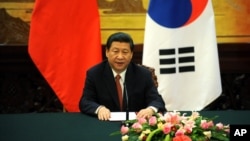Chinese President Xi Jinping says his government is willing to shelve territorial disputes and carry out joint development in disputed waters.
State media reports Xi made the remarks in a speech to the country's powerful Politburo on Wednesday.
He is quoted as saying that although he is willing to put aside disputes to foster development, China will not cede its claims of sovereignty. He did not mention any maritime area by name, but his remarks follow a visit to Beijing by Japanese Vice Foreign Minister Akitaka Saiki.
Last year, Tokyo angered Beijing by nationalizing a group of uninhabited East China Sea islands, known in Japan as Senkaku and in China as Diaoyu. Since then, China has increased its patrols near the island chain, raising fears of clashes between Asia's two largest economies.
In the South China Sea, China is embroiled in territorial disputes with Japan, Vietnam, the Philippines, Brunei and Malaysia over several resource-rich islands. In July, China rejected Philippine charges that Beijing is increasing its military activity in the South China Sea area and threatening stability in the region.
The U.S. has urged all of the countries involved to settle their differences peacefully.
In June, the top American military commander in the Pacific issued a stern warning to any country that might try to seize control of disputed areas in the South China Sea. Admiral Samuel Locklear, commander of U.S. Pacific Command, said, "We will oppose the change of status quo by force by anyone."
State media reports Xi made the remarks in a speech to the country's powerful Politburo on Wednesday.
He is quoted as saying that although he is willing to put aside disputes to foster development, China will not cede its claims of sovereignty. He did not mention any maritime area by name, but his remarks follow a visit to Beijing by Japanese Vice Foreign Minister Akitaka Saiki.
Last year, Tokyo angered Beijing by nationalizing a group of uninhabited East China Sea islands, known in Japan as Senkaku and in China as Diaoyu. Since then, China has increased its patrols near the island chain, raising fears of clashes between Asia's two largest economies.
In the South China Sea, China is embroiled in territorial disputes with Japan, Vietnam, the Philippines, Brunei and Malaysia over several resource-rich islands. In July, China rejected Philippine charges that Beijing is increasing its military activity in the South China Sea area and threatening stability in the region.
The U.S. has urged all of the countries involved to settle their differences peacefully.
In June, the top American military commander in the Pacific issued a stern warning to any country that might try to seize control of disputed areas in the South China Sea. Admiral Samuel Locklear, commander of U.S. Pacific Command, said, "We will oppose the change of status quo by force by anyone."





